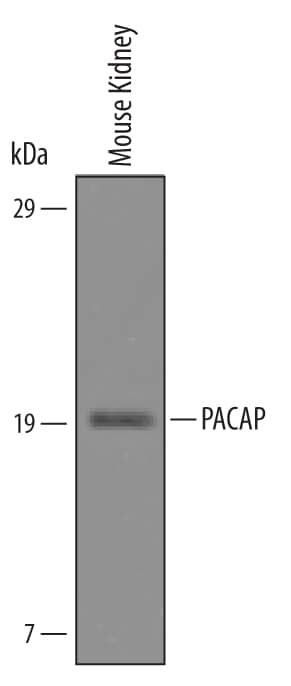Mouse PACAP/ADCYAP1 Antibody
R&D Systems, part of Bio-Techne | Catalog # AF6380

Key Product Details
Species Reactivity
Applications
Label
Antibody Source
Product Specifications
Immunogen
Pro26-Leu175
Accession # O70176
Specificity
Clonality
Host
Isotype
Scientific Data Images for Mouse PACAP/ADCYAP1 Antibody
Detection of Mouse PACAP/ADCYAP1 by Western Blot.
Western blot shows lysates of mouse kidney tissue. PVDF Membrane was probed with 1 µg/mL of Human PACAP/ADCYAP1 Antigen Affinity-purified Polyclonal Antibody (Catalog # AF6380) followed by HRP-conjugated Anti-Sheep IgG Secondary Antibody (Catalog # HAF016). A specific band was detected for PACAP/ADCYAP1 at approximately 17 kDa (as indicated). This experiment was conducted under reducing conditions and using Immunoblot Buffer Group 2Applications for Mouse PACAP/ADCYAP1 Antibody
Western Blot
Sample: Mouse kidney tissue
Formulation, Preparation, and Storage
Purification
Reconstitution
Formulation
Shipping
Stability & Storage
- 12 months from date of receipt, -20 to -70 °C as supplied.
- 1 month, 2 to 8 °C under sterile conditions after reconstitution.
- 6 months, -20 to -70 °C under sterile conditions after reconstitution.
Background: PACAP/ADCYAP1
PACAP (Pituitary adenylate cyclase activating polypeptide) is a 17 kDa (predicted) member of the VIP/secretin/glucagon/GHRH superfamily of peptides. It is expressed by anterior pituitary gonadotrophs, neurons in the CNS and PNS, spermatids, adrenal chromaffin cells, plus macrophages and lymphocytes. PACAP has multiple effects. On mast cells, it induces histamine release; on lymphocytes, PACAP promotes Th2 development; in bone, PACAP inhibits osteoclastogenesis; and in the pituitary, PACAP facilitates the release of LH (in females), GH and alpha‑MSH. Mouse PACAP proprecursor is 151 amino acids (aa) in length (aa 25‑175). It undergoes proteolytic processing to generate two C‑terminal amidated peptides termed PACAP-38 (aa 131‑168) and PACAP-27 (aa 131‑157). In general, PACAP-38 represents the dominant form. However, the ratio between the -38 and -27 forms differs in a cell-specific manner. Over aa 25‑175, mouse PACAP shares 95% and 81% aa identity with rat and human PACAP, respectively.
Long Name
Alternate Names
Gene Symbol
UniProt
Additional PACAP/ADCYAP1 Products
Product Documents for Mouse PACAP/ADCYAP1 Antibody
Product Specific Notices for Mouse PACAP/ADCYAP1 Antibody
For research use only
